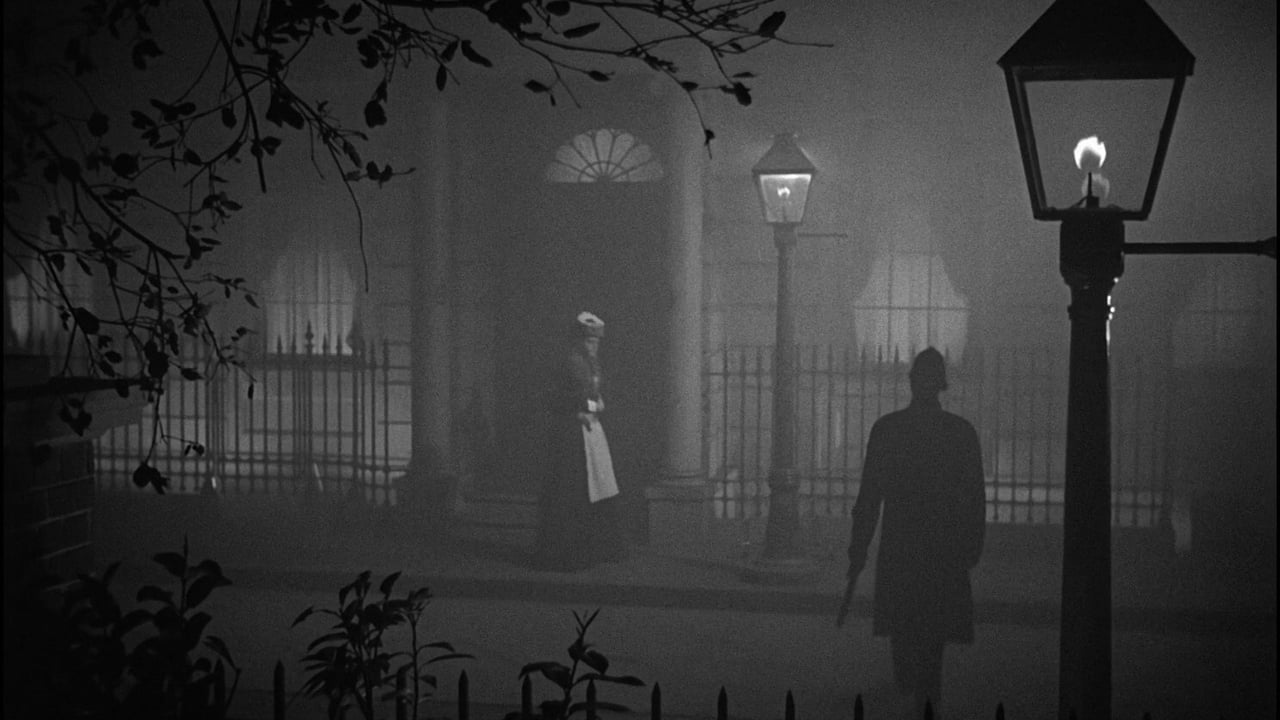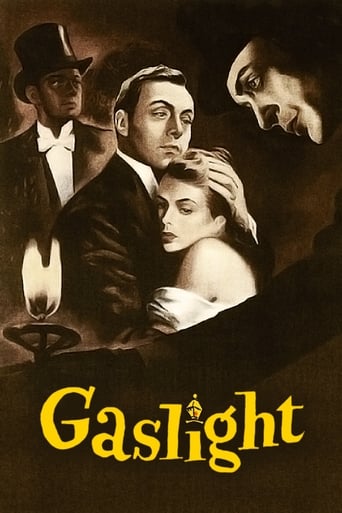

Truly Dreadful Film
... View MoreA Brilliant Conflict
... View MoreActress is magnificent and exudes a hypnotic screen presence in this affecting drama.
... View MoreWorth seeing just to witness how winsome it is.
... View MoreThey say a film is as good as the villain, but sometimes, the villain might be too good for the film's own good. I don't think I've been as distraught and upset by a villain as I was by the manipulative expert Gregory Anton in George Cukor's "Gaslight", the most famous and best adaptation of Patrick Hamilton's play. Indeed, enduring the psychological torture he applied to his love-seeking wife Paula, played by an emotionally versatile Ingrid Bergman, was such an infuriating experience that I left almost one decade between the first and the second viewing, and I literally tiptoed to the DVD to force myself to refresh my memory. After the first fifteen minutes, just when I thought I could stand it, I realized that any horror movie would have been more supportable... or am I overreacting?I think there must have been some strong reaction toward that novelty of a plot where a person drove another one insane through mental manipulation to the point that "gas light" became part of common language... that's how impactful it was. Not many movies deal with that particular device, but this is how "Gaslight" was revolutionary and sophisticated in a twisted way, suiting the emerging noir genre. The "gas light" effect referring to the dimming of the light that made Paula believe she was going crazy isn't effective on a narrative level because it's driven by a fact but rather by the seeds of doubt it sows on her mind. We know for a fact that a woman is being manipulated but only suspicion can heal her from her husband's cruel dominance.But she can't suspect him because she loves him in a way that echoes Stockholm Syndrome and he's a Machiavellian gourmet who knows exactly the amount of cruelty and suavity to apply.Charles Boyer's with all these cunning eyes, that mouth always wary about not letting a word slip, and his faux-affable "French lover" manners, elevate his characters to summits of vileness and gaining extra altitude by a symmetric effect with Ingrid Bergman who brings an extraordinary level of pathos while maintaining a strange aura of dignity. This is a woman whose heart and mind are slowly shred to pieces but she's resigned to believe any word of her beloved husband because she can envision anything except such capability of vileness. Why would the gaslight dim every night? Why would she hear noises the servant doesn't notice and why would Gregory be wrong if the second maid wasn't so arrogant and defiant? Even Angela Lansbury in her screen debut is perfect in the role of Nancy, the street smart and slightly slutty maid whose deadpan and snarky attitude is more affecting than any hint of false empathy or true detachment. This is a free-spirited woman yet manipulated by the way Gregory exploits every element of the environment and every possible situation. So what we have is a conspiracy perfectly oiled where Cukor makes us witness the action while making us as powerless as Paula. We're like passive observers bound and gagged and undergoing the villain's sadism. In a way, if we consider anger as a brief madness, we're also being "gaslighted" by Cukor.The mark of great films is to elicit strong responses; and watching "Gaslight" a second time reminded me of something I meant as a compliment after my initial viewing, I thought it was the most Hitchcockian non-Hitchcock film... and the presence of Dame May Whitty or Joseph Cotten play like interesting nods to "The Lady Vanishes" and "Shadow of a Doubt". In"Vanishes", the main protagonist was toyed with her own certitudes and lured into doubting her own sanity and "Shadow" is about a villain who's a close parent. "Gaslight" makes these two plot points converge beautifully but there is another Hitchcock classic it bears a kinship with: "Suspicion". And I think I can now be more explicit about what bothered me with "Suspicion" and that makes "Gaslight" a superior movie. In "Suspicion", the husband's guilt was the central theme but worked as a double edged word, if he was guilty, then he left too many hints to be a believable villain, if he wasn't, it was anticlimactic. In "Gaslight", we know the villain from the start and we know he's good at hiding his vileness (the essence of 'gaslighting') and the frustration doesn't come from the act but the lack of suspicion, the point is the psychological struggle within a woman whose passion blinds her mind and endangers it, a woman who trades her self-esteem for the sake of the most harmful person she could ever meet. "Gaslight" foreshadowed, no pun intended, the way film noir would dominate post-war cinema, at a time where many people were blinded by patriotism and driven to real madness by leaders who had contempt for them. "Gaslight" is also a marvel of film noir in its use of the nightmarish fog of London Victorian streets used as the perfect camouflage for a Jekyll/Hyde villain, and where d the walls of respectability of an ordinary house, hid the claustrophobic nightmare of a woman lost among so many useless items and trophies, being the most precious one of all... or the most disposable.Boyer, Lansbury were all Oscar-nominated, but it was Bergman who won thee first of the three Oscars and deservedly so. In what could have been a one-note performance she explores every possible shade of fragility, doubt and panic, disbelief and resignation, whiplash moods orchestrated by her evil husband until her shining moment at the end, perhaps one of the most satisfying rants, where the whole scheme of Gregory backfires in the most delightful way.But I still wonder why he wasn't listed in AFI's Top 50 villains, the film made the "thrills" list but who made the thrills?
... View MoreCharles Boyer is deliciously creepy and evil in this psychological thriller from 1944, and Ingrid Bergman plays the part of his young wife well, slowly tricked into believing she's losing her mind. Joseph Cotten is her knight in shining armor, and Angela Lansbury makes the most of a small part in her very first film role at the age of 18, as the somewhat flirtatious young maid in the house, and we wonder if she has a role in the scheming that's going on. I loved how Director George Cukor made the film as claustrophobic as Bergman feels herself, by keeping most of the scenes indoor amidst dark lighting and shadows, and outdoor scenes enveloped in London fog. It's quite atmospheric. The movie seems to lack tension towards the middle, when everyone knows what's going on - what Boyer is doing and how he is doing it (which is a bit of a weakness) – but it ends very well, with some scenes that may have you on the edge of your seat.
... View MoreI was left in perfect 'awe' after the climax. Like, seriously? who would've thought a story like this back in 1944? This is Hollywood at it's best. Ingrid Bergman and her natural beauty was so mesmerizing. This had the blend of everything. Charles Boyer stole the show with his solid performance. Pushing your wife to thinking she is insane!? damn. Perfectly acted, perfectly directed. Where are movies like these now? Ignore the people and make this one a must watch. Joseph Cotten too gave one hell of a performance. Ingrid Bergman gave the performance of her lifetime which also got her an Oscar. The way the suspense builds up, Gaslights going off are surely giving you the chills. Make this a must, must watch.
... View MoreImmensely Irritating Film with Good Performances and Lavish, Gaudy, Cluttered, Claustrophobic Sets. Heavy Handed and Relentlessly Edgy, this Over Baked Melodrama is a Favorite of Movie Buffs.The now Shop-Worn Story certainly Played Much Better in 1944. Audiences Today must Muster a Goodly Amount of Suspension of Disbelief to Imagine some of what Goes on Here. Charles Boyer is so Domineering and Ingrid Bergman is so Docile that some Modern Viewers will Lose Patience Quickly.But if You Go With it and Allow it to Unfold it can be a Marvelous, if Manic, bit of Gothic-Noir. Bergman is so Lovable and Quaint Her Abuse, from the outset, Rides the Edge that keeps Sympathies with Her and is in Danger of Losing Not only Her Mind, but the Audience as well.In Fact, both Leads Play the One Note of Good and Evil Continuously for the Long Running Time and Joseph Cotten as a Scotland Yard Investigator Figures Things Out maybe a Reel to Late to Save the Movie from Collapsing under its own Weight of Repetitive Similarity.In Support, Angela Lansbury got the Oscar, as well as Bergman, and is Creepy as can be, but May Witty as the Comedy Relief, like most of the Movie, tends to Grate on the Nerves.Overall, a Must See for Classic Film Fans, the Movie has a Reputation that Cannot be Denied. Superbly Mounted and Presented in High Hollywood Gloss.
... View More